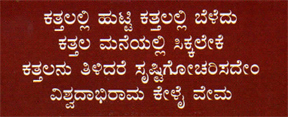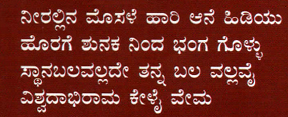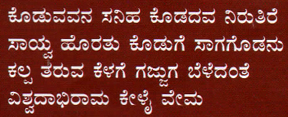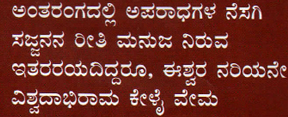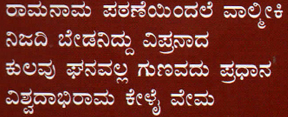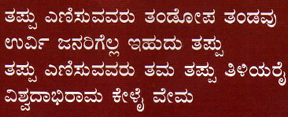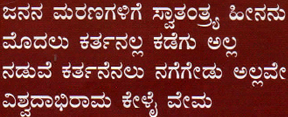About Vemana
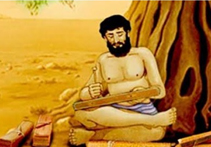
Vemana was a Telugu poet. He composed numerous poems in Telugu in Aata Veladhi metre which consists of four lines; the fourth line, with some exceptions, is the refrain or chorus Viswadabhirama Vinura Vema. Vemana's style is simple; his poems deal with social problems and sometimes propose solutions too. With the zeal of a social reformer, many of his poems criticise and strive to give fresh perspective to ardent followers of old, embedded traditions. Vemana is often portrayed in the nude.
Biography
Basically Vemana was a Yogi. He disseminated his philosophy in simple Telugu verses. And he is very famous in Telugu literature, relatively very less is known about the actual poet.
Vemana was from Kapu social group having the title 'Reddy'. He was a native of Kadapa district and believed to have lived in Gandikota area. He was born at Mugachintapalli. Later he moved to Kondaveedu to learn Achala Yoga from Lambika Shiva Yogi. He wandered most of the southern India to propagate his Achala Philosophy through verses. At the end of his life, he settled in Katarlapalli near to Kadiri.
Scholars do not unanimously agree about the period in which he lived. C.P. Brown, who did extensive work on Vemana in his preface to the English translation Verses of Vemana, states that the date of birth from his 707th verse is Vemana's date of birth. But it is not clear. This cyclical date of Hindu calendar coincides with 1352 or 1412 or 1472. Brown also wrote that the verses of Vemana were 400 years older in his preface of the book 'Vemana padyalu'. So it is inferred that he was born in the year of 1352. He denied the false religious systems and blind beliefs. He discouraged idol worships. He preached universal brotherhood. He is not Advaitin. He refuted the theories of Dwaita and Visisthadvaita also. He was a great Achala yogi.
The Andhra Pradesh government established a University in Kadapa in his name Yogi Vemana University. The university construction has been started and going in full pace to start its operations by 2008.
Literature and Style
Many lines of Vemana's poems are now colloquial phrases of the Telugu language. They end with the signature line Viswadhaabhi Raama, Vinura Vema, literally Beloved of Vishwadha, listen Vema. There are many interpretations of what the last line signifies. Vemana's poems were collected and published by C.P.Brown in the 19th century. His poems are of many kinds, social, moral, satirical and mystic nature. All of them are in Ataveladi (dancing lady) meter.
Sample Poetry
Uppu Kappurambu nokka polika nundu
Chooda chooda ruchulu jaada veru
Purushulandu Punya purushulu veraya
Viswadhaabhiraama, Vinura Vema
Salt and camphor look similar,
but closer observation shows their taste is different
Among men, virtuous people stand apart
Beloved of the Bounteous, Vema, listen!
Gangi govu paalu garitadainanu chaalu
Kadivedainanemi kharamu paalu
Bhakti kalugu koodu pattedainanu chaalu
Viswadhaabhiraama, Vinura Vema
A ladleful of a Sacred cow's milk is enough
Of what worth is even a potful of donkey's milk
Even a little food given with respect is sumptuous
Beloved of the Bounteous, Vema, listen!
tmasuddhi leni acharamadi ela
Bhandasuddhi leni pakamadi ela
Chittasuddi leni sivpujalelara
Viswadhaabhiraama, Vinura Vema
What is the purpose of custom sans inner purity?
What is the purpose of cooking sans cleanliness of vessels?
What is the purpose of worship of Shiva sans purity of mind?
Beloved of the Bounteous, Vema, listen!


